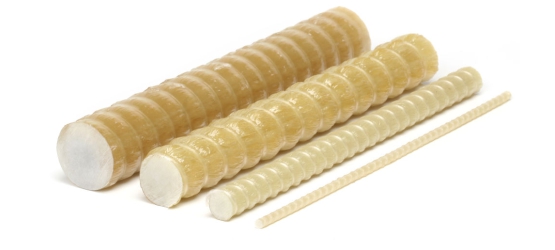- April 25, 2024
- Posted by: wellcoindustries
- Category: Rebar
Here’s a breakdown of the properties, uses, advantages, and installation of fiberglass mini rebar:

Properties
Fiberglass mini rebar, also known as fiberglass reinforced polymer (FRP) rebar, is made from fiberglass and a polymer resin, often vinyl ester or epoxy. Key properties include:
- High tensile strength: Fiberglass rebar has a tensile strength higher than steel rebar of the same diameter.
- Lightweight: It’s significantly lighter than steel, making it easier to handle and transport.
- Corrosion resistance: Unlike steel, fiberglass does not rust or corrode, which is particularly useful in harsh environments.
- Non-conductive: It does not conduct electricity, which makes it ideal for structures that require electrical insulation.
- Thermal insulation: It does not conduct heat, maintaining more consistent internal temperatures in structures.
Uses
Fiberglass mini rebar is used in a variety of applications where the properties mentioned above are beneficial:
- Infrastructure: Roads, bridges, and marine structures where corrosion from salt and chemicals is a concern.
- Buildings: Particularly in medical and electronic facilities that require non-magnetic and non-conductive materials.
- Water treatment plants: Due to its resistance to chemical corrosion.
- Pre-cast concrete elements: Like sewer pipes and manholes where longevity and resistance to environmental factors are crucial.
Advantages
- Durability: Long lifespan due to its resistance to corrosion and chemical attack.
- Safety: It’s non-conductive and non-magnetic, suitable for sensitive installations.
- Lightweight: Easier and less costly to transport and handle on site compared to steel.
- Maintenance: Virtually maintenance-free due to its inherent durability and resistance properties.
Installation
Installation of fiberglass mini rebar is similar to that of steel rebar, but with some considerations due to its material characteristics:
- Handling: Even though it’s lightweight, care must be taken during handling to avoid cracking since it is more brittle than steel.
- Cutting: Special cutting tools are not required; it can be cut with standard diamond-coated cutting blades.
- Bending: It generally cannot be bent in the field and is usually pre-formed into the required shapes at the factory.
- Fastening: Special care must be taken during tying and fastening, using proper ties and not wire, which may damage the surface.
When using fiberglass mini rebar, it’s important to follow specific guidelines provided by the manufacturer for handling, cutting, and installing to ensure the structural integrity and long-term performance of the reinforced concrete.
